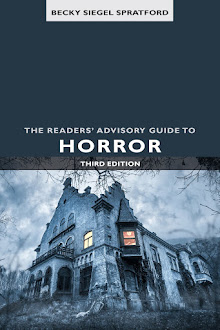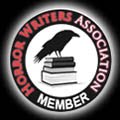John Glover is a librarian at Virginia Commonwealth University, where he supports humanities research and instruction, contributes to various digital humanities projects, and studies quaint and curious volumes of forgotten lore. He has chapters forthcoming on Supernatural Horror in Literature and Laird Barron’s Old Leech stories. He also studies the research practices of writers, and last year he co-taught “Writing Researched Fiction” in VCU’s Department of English. He publishes fiction and literary essays as “J. T. Glover,” and his work has appeared or is forthcoming in Pseudopod, Thinking Horror, The Lovecraft eZine, and Nightscript, among other venues.How did I know about it? Well because he quotes me and references my book [which by the way, can be bought as an eBook right now. You can start using it today and then use the archives of this blog to supplement it. I consider this blog the free update to the book-- shameless plug over].
Back to Mr. Glover. The essay is entitled, "The Life and After Life of Horror Fiction." From one of the opening paragraphs:
"If it weren’t for the rise of the web and its capacity to perpetuate both communities and content, the term “horror” would largely have fallen out of use by now to describe the genre. As things stand, however, I feel that we’re currently in the middle of two waves of fiction that could rightly be called “horror,” each as similar and distinct as the Gothic and the pulps. One of these waves is essentially the long tail of the last boom, and the other is a new formation built from literary fiction, a new attention to sociocultural concerns, and explicit engagement with the genre’s history. The coexistence of these two waves has caused anxiety in the field, not least because the word “horror” itself became anathema after the market crash of the mid-1990s. Many authors working today take a nuanced approach to writing horror—heavily informed by the lessons of the boom."While my focus is on the readers of horror and how to match the books with them, Glover is more focused on the literature of horror itself. This is a very insightful and interesting article that will give you a larger view picture of the current state of horror.
It also serves as a way to look at what we do-- matching readers with books-- from the other side of the equation. It may sound like semantics, but think about it. We, rightfully, start with the reader in front of us and then try to find the correct book for that reader. This is the correct way for us to have the RA interaction. But, sometimes it helps to step out of your focus for a second and take a look at things from the other side of the coin. Taking a moment to begin with the books themselves, gives you a chance to look with fresh eyes at the patron in front of you. It gives you a different perspective and makes you think.
So thanks to Glover for being the "Bizzaro Becky." Check out his essay. I promise you will learn something about the current state of horror fiction.




No comments:
Post a Comment